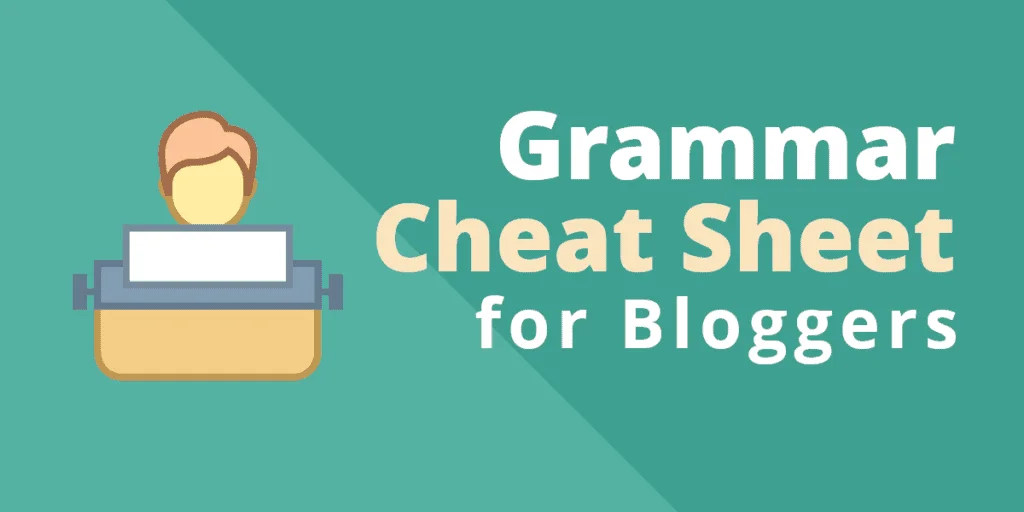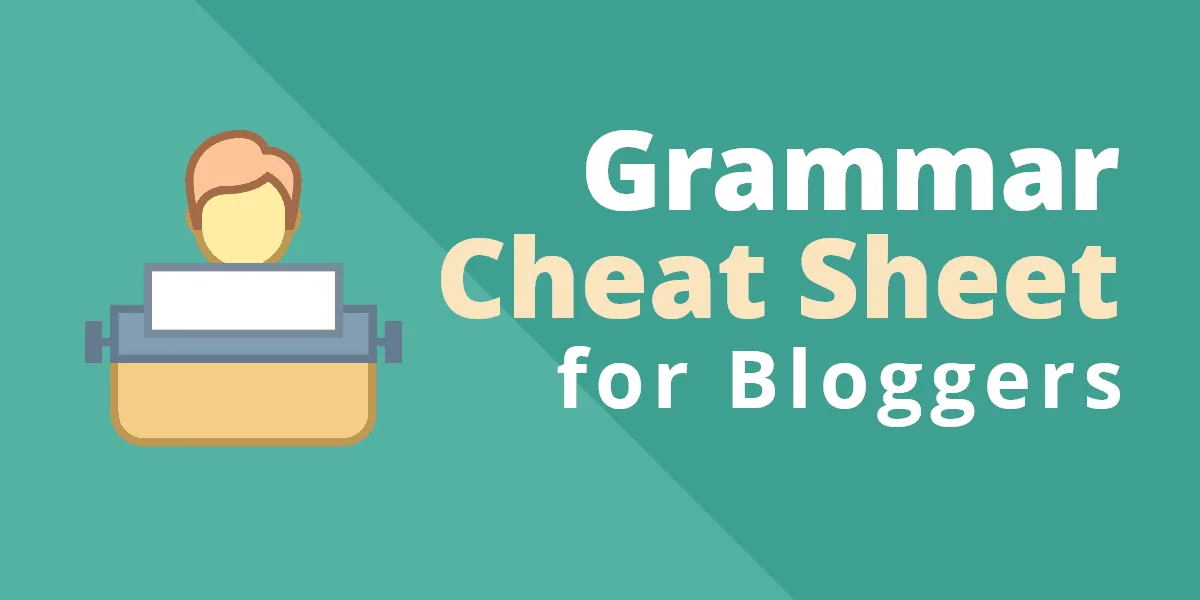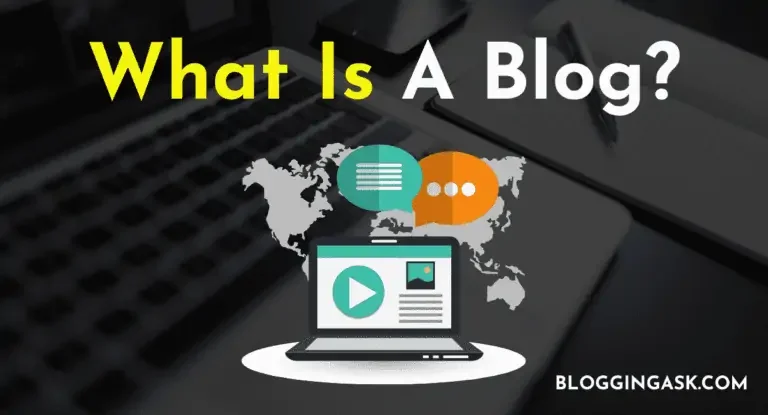Who or Whom? Data or datum? And why do some people freak out when they see “15 items or less” at the grocery store?
If you’re running a blog, getting grammar right is really helpful. For one thing, it will protect you from roaming gangs of Grammar Nazis patrolling the internet.
But more important, it’ll make you a better writer. Your readers will appreciate it, even if they aren’t conscious of why.
This guide will cover those pesky words that we all get confused about from time to time.
It will show you the right word to use when you’re pounding away at the keyboard.
And above all, it will make your writing clearer. This is one of the best Grammar Cheatsheet for bloggers.
Best Grammar Cheatsheet for Bloggers in 2024

Just One Small Caveat
The purpose of grammar is not to be 100%, absolutely correct. It’s to make your writing easier to understand.
With that in mind, some of these rules skirt the official, unyielding rules of those who believe grammar to be prescriptive.
Rather, they reflect how grammar is working today (for an example, check out data vs datum).
This guide won’t necessarily put you in first place on a grammar game show — but it will make your blog posts a lot easier to read.
Mistaken Words
Probably the hardest thing about writing is managing the difficult world of homophones. These are sets of words that sound the same but have different meanings and spelling.
The reason is that our primary connection to language is verbal. It doesn’t matter is we say, “The king sat on the thrown.” But writing that same thing is embarrassing.
Below we discuss the most important of these word mix-ups. If you want even more examples of these, check out The Grammar Bible: Everything You Always Wanted to Know About Grammar but Didn’t Know Whom to Ask by Michael Strumpf and Auriel Douglas. It contains hundreds of examples.
Affect vs Effect
If you’re only going to learn just one rule from this cheat sheet, make it this one.
Using these words incorrectly is so common that it’s difficult to know what the right usage is when you read it, let alone how to write it. That’s true of effect/affect more than anything. Fortunately, we’ve got a shortcut for you.
The Official Rules
In general, “affect” is a verb that means to have an impact on something and “effect” is a noun, as in the effect of something on something else.
However, just to confuse things, “effect” can also be a verb meaning to cause something to happen.
And, to further complicate things, “affect” can be a noun, but only very rarely — generally in psychology.
Examples
Affect as verb
The boy was affected by the trauma he had witnessed.
Affect as a noun
The experiment triggered a strong negative affect on the participants.
Effect as a noun
The effect of the economic downturn was a depressed job market.
Effect as a verb
I hope to effect significant change at my organization in the coming years.
Most of the time, assuming affect is a verb and effect a noun is right — but not always…
Rules of Thumb
Given the variety of forms these particular words can take, you might still be confused. Fortunately, there’s a shortcut.
Assume that if a verb makes sense, it’s probably going to be “affect.” And if it’s a noun, it’s probably going to be “effect.”
If you’re not sure, try switching in another noun and another verb to see if the sentence makes sense.
Take, for example, the sentence, “The boy was streetcar by the trauma he witnessed.” It doesn’t make any sense because “streetcar” is a noun.
But take the sentence, “The boy was bamboozled by the trauma he witnessed.” It does make grammatical sense because bamboozle is a verb.
The same goes for effect.
Consider: “The streetcar of the economic downturn was a depressed job market.” Versus: “The bamboozle of the economic downturn was a depressed job market.”
As you can see, only “streetcar” sounds right.
Except vs Accept
These two are difficult because they’re similarly spelled homophones. But they have two very different meanings.
The Official Rules
“Except” means to exclude something or say “everything but this one thing.”
“Accept” means to receive something or recognize an idea as true or correct.
Examples
Since this single word can completely reverse the meaning of a sentence, it’s particularly problematic. For example, imagine the sentences:
- People usually accept facts of the argument.
- People usually except facts of the argument.
The first sentence means that the facts are generally agreed to be true or correct. The second (admittedly clumsy) sentence means that the facts are generally ignored or excluded.
That’s why getting it right is so important.
Rules of Thumb
Fortunately, there is an easy way to remember:
- If you want to use “accept,” remember that it needs to be a-okay. If something is a-okay, then it can be accepted.
- If it’s not a-okay, then it’s probably going to be “except.”
That’s because “accept” is normally used to describe something positive, whereas “except” is usually describing something that doesn’t conform or is negative.
Lose vs Loose
In this case, the words don’t sound the same but are spelled very similarly. If you get this wrong, you might look silly, but it is unlikely that your reader will be confused.
The Official Rules
“Lose” is a verb that means to not win, to experience a loss, or to misplace something.
“Loose” is usually an adjective to mean not tightened down. However, it can also mean to release.
Examples
- When I play chess, I lose about half the time.
- The screw was loose, so the table fell apart.
Rules of Thumb
A good way to remember this is the rhyme, “There’s a moose on the loose.”
If you’re spelling it with two Os, then it has to rhyme with “moose.” If you’re only spelling it with one, then you mean that you lost something.
They’re, Their, and There
This particular grammar rule gets a lot of discussion throughout popular culture. But the truth is, it’s not that hard to get this just right.
And unlike many of the “rules” on this list, their/there/they’re is one where there truly is no wiggle room. You’re either correct or not.
Fortunately, it’s easy to use the right one.
The Official Rules
“They’re” is a contraction of “they are.”
“Their” is the possessive form of “they.” It shows ownership of something.
“There” is an adverb referring to a place. It points to where something is or is going.
Examples
- They’re wondering where the dog went.
- Their dog ran into the cafe.
- They found the dog when they went over there.
- “They’re there with their friends.”
- “Their friends hate being there but they’re putting up with the cold anyway.”
- “There in the cold they’re freezing their fingers off.”
Rules of Thumb
If you want to know if you should be using “they’re” just switch out the word for “they are.” If it still makes sense, you’re good to go.
For “their” and “there,” try replacing the word with “our.” If it still makes sense, then you should use “their.” If it doesn’t, then you need to use “there.” For example:
- Our dog ran into the cafe. — Their dog ran into the cafe.
- They found the dog when they went over our. — They found the dog when they went over there.”
The first sentence makes sense but the second doesn’t. Thus, the first sentence uses “their” and the second uses “there.”
Two vs To vs Too
“To,” in its various forms, is one of the most common words you’ll ever write. Knowing which “to” to use is critical.
Fortunately, the rules are easy to remember.
The Official Rules and Examples
“Two” is the written version of the number 2: “An infinitive has two words.”
“To” has two functions. First, it is used to show movement or direction: “Let’s go over to the library.”
Second, it is used to create infinitives, which are verbs that are not bound to a subject. For example: “Star Trek was a show meant to go boldly where no human had gone before.”
The word “too” has two functions as well. First, it can be used as an adverb meaning “also.” For example: “I went to the store too.”
“Too” can also be used as a modifier meaning “excessive.” For example, “The water was too hot.”
Rules of Thumb
Getting the right “to” is easy. First, unless you’re talking about the number 2, don’t use “two.”
Second, “too” will very often go at the end of a sentence: “We went to the library too.” If it’s mid-sentence, however, and you’re not sure, substitute the word with “very” or “also.” If it makes sense with either, use “too.”
Finally, if in doubt, use “to.” This is by far the most common one that you’ll use, so if you’re really not sure, this is your best guess.
Data vs Datum
Yes, there is an actual rule here. However, it’s worth noting that, like many other words, data is used incorrectly so often it’s unlikely to have any impact on readability or comprehension.
If you simply use what you think sounds best, 99% of the time that’s going to be absolutely fine.
However, if you’re writing something academic, talking about primary research, or just want to get it 100% right, then here’s how you can know when to use data and when to use datum.
The Official Rules
“Data” is a Latin-based word and is the plural of “datum.”
“Datum” is the singular version of “data.”
Examples
- The data show that the hypothesis was correct.
- One outlying datum point is fairly standard to see in experiments.
Rules of Thumb
In general, you should always use “data.” Using “datum” will make you sound pedantic and pretentious. What’s more, it will confuse many of your readers.
The only time you should use “datum” is if you are writing for a publication that uses it. Thus, you might use “datum” in a scientific paper. But even in this context, it is getting increasingly rare.
Given this, the examples above should be changed to:
- The data show that the hypothesis was correct.
- One outlying data point is fairly standard to see in experiments.
Note: if anyone ever gives you any guff about “datum,” ask them what they think of the word “media” as in all the newspapers, magazines, and television shows.
It is almost always treated as being singular. For example: “The media is biased!” But if someone insists that you say “datum point,” you can insist they say “media are.”
Quote vs Quotation
This is an easy one to get right. But it’s worth noting that, like so many things in language, the incorrect version is used so often now that it’s rarely seen as an error.
Thus, it’s not essential to get this one right. But if you want to keep your writing clean and clear, it helps to be correct.
The Official Rules
“Quote” is a verb. “Quotation” is a noun.
Examples
- To quote Shakespeare, “Man delights not me.”
- One of my favorite Shakespeare quotations is “Man delights not me.”
Rules of Thumb
The best way to know if you’re right is to switch the word for “goat.” If the sentence still makes sense, it’s “quotation.” If not, it’s “quote.” If you like rhyming couplets:
- If it’s “goat”
- Don’t use “quote.”
Desert vs Dessert
This one is trickier than most people know. It does require a bit of memorization.
The Official Rules
The basic one that most people know is that desert is “an arid land.” It is also used as a verb meaning “to abandoned.” Contrast this with dessert which is the sweet course of dinner (also usually the last).
The easy way to remember these spellings is to remember that a desert is lacking (thus the word has only one “s”). But a dessert is a treat — something extra (thus it has two s-letters.)
“Just deserts” have nothing to do with the desserts parents often give their children for cleaning their plates…
The Unusual Desert
Most people don’t have much problem keeping these straight.
The problem comes from a word that isn’t used that much anymore: desert meaning “something deserved.” Outside of moral philosophy, it is used almost exclusively in the idiom “just deserts.”
This is incorrectly spelled “just desserts” more often than correctly. And it is easy to see why. “Just desserts” makes sense. For example, when a person has stayed on their diet, we might say that justly get to eat dessert.
Unfortunately, this is not what the phrase means. Desert in this context means “deserved reward or punishment.”
In other words: that which is deserved. But given how rarely this form is used, you can simply remember “just deserts.”
Especially if you are writing for educated people, getting this wrong will look bad and distract from everything else you write.
On the other hand, since most people are ignorant on this point, using this form of desert can be confusing — even causing readers to wrongly criticize you.
As a result, avoid “just deserts” and other such constructs.
Examples
- He ate a dessert at the restaurant at the edge of the desert.
- She thought the deserts of her moral lapse to be out of proportion.
Breath vs Breathe
This is another quote/quotation situation. But unlike that situation where it doesn’t matter too much if you get it right, this distinction is important. Y
ou will look ignorant if you use the wrong word.
The Official Rules
“Breath” is a noun, meaning the air in your lungs. You can take a quick breath or you can hold your breath.
“Breathe” is a verb. It’s the doing version of breath. You take breaths, but what you do is breathe.
Examples
- He took a deep breath to steady his nerves.
- If you’re feeling stressed, remember to breathe through your nose.
Rules of Thumb
If you’re struggling to remember which one to use, here are two tricks to help you.
- Remember the extra “e” in “breathe” is for “exhale,” since that’s what you do when you “breathe.”
- Switch the word for the word “death.” If it still makes sense, then “breath” is the word you want. If it doesn’t, then it needs to be “breathe.” Here’s another rhyming couplet:
- If it works with death
- It must be breath.
It’s vs Its
Even experienced writers make this mistake. And there’s a good reason: it isn’t logical.
The Official Rules
“It’s” is a contraction of “it is” or “it has.” “Its” (with no apostrophe) is the possessive form of “it” and is used as an attributive adjective. This means that it connects the adjective to the noun being described.
Examples
- It’s very cold outside.
- It’s been very cold outside.
- My cat destroyed its favorite toy.
Rules of Thumb
Like most contractions, expanding the word into its separate terms will tell you if you’re right or not. If you expand “it’s” into “it is” or “it has” and the sentence still makes sense, then using the apostrophe is correct.
If not, you should drop the apostrophe and use “its.”
You’re vs Your
Yet another problem caused by apostrophes.
The Official Rules
“You’re” is a contraction of “you are.” “Your” is the possessive version of you. It’s used mostly to show ownership of something, but it can be used for a few other things like an informal collective: “He’s your Average Joe.”
The possessive function is the most common, and where the most mistakes crop up.
Examples
- Your suit is really nice.
- You’re suited well for this job.
Rules of Thumb
Like all contractions, the best way to know if you’re right is to simply expand the words out to you are.
If the sentence says what you want, then it should be “you’re.” If it doesn’t then it should be your with no apostrophe.
For example, “You are suit is really nice” doesn’t make sense. But “You are suited well for this job” does.
Who’s vs Whose
Once again, the apostrophe rears its ugly head. But as with It’s/Its and You’re/Your, it isn’t hard to figure out which one is right.
The Official Rules
“Who’s” is a contraction of “who is.” “Whose” is the possessive form of “who” or, more informally, “which.”
Examples
- Who’s going to host the party?
- Whose party are you going to?
- Whose [Which] team are you supporting?
Rules of Thumb
The best way to make sure you’re using any contraction correctly is to separate out the words.
If you can swap in “who is” for your word and it still makes sense, then you need the apostrophe. If it doesn’t then the answer is “whose.”
We’re vs Were
Although these two words look similar and sound identical, they are very different.
The Official Rules
“We’re” is short for “we are.”
“Were” is the past version of the verb “to be.”
Examples
- We’re going to the movies.
- Where were you last night?
- Were you going to the game later?
Rules of Thumb
Like all apostrophe problems involving contractions, simply read your sentence aloud with the un-contracted words. In this case, “we are.”
For example, “We are going to the movies” makes sense. “Where we are you last night” does not.
If it makes sense when you un-contract, use “we’re.” If it doesn’t, then you need to use “were.”
Each Other’s vs Each Others’
This is another funny apostrophe that seems to throw a lot of people off, but the fact is only one of these is right: “each other’s.”
The Official Rules and Example
Each other’s is the possessive form of each. Since we generally add ‘s to nouns to make them possessive, we do that here.
The reason that it’s not “each others’” is because it would imply that “other” was a plural noun.
For example, “We held each other’s hands” is correct. “We held each others’ hands” is not.
Rules of Thumb
The easiest way to remember this is to remember that “other” is singular. If you remember that, then you can’t go wrong.
Allot vs A Lot
Sorry to all you “alot” fans out there, but there’s some bad news. “Alot” just isn’t a word. No major dictionary recognizes it.
However, “allot” is a word! It is a verb meaning “to assign some part of a larger product.
It’s hard to confuse a lot with allot. That’s because allot is a simple verb. A lot is much more complex.
For example, consider the sentence, “I made a lot of money.” If we say that of is not part of a lot (“of money”), then lot is the object of the sentence (“I have a lot”) and of money modifies lot.
But if “of” is part a lot (“a lot of”), then money is the object making “a lot of” a descriptor of money.
- I made [a lot] of [money]. — I made a [noun] of [adjective].
- I made [a lot of] [money]. — I made [adjective] [noun].
So the rule is easy. Never, ever use “alot.” It’s always “a lot.”
Then vs Than
The difference between “then” and “than” is probably one of the most confusing issues commonly facing a writer. This is particularly true because each of these words has so many functions.
The Official Rules
“Then” is an adverb but can be used as an adjective. Normally, it’s used in some way related to time or process.
“Than” is a conjunction used to compare two or more things.
Examples
- I was at the pool then.
- First, you add the eggs, then you add the sugar.
- I like potatoes more than carrots.
Rules of Thumb
If you’re talking about something that happens in a series, you use “then.” If you’re not talking about a series like that, you probably mean “than.”
Another way to remember it is “than” is for making comparisons. Finally, you always have more “than” or less “than” someone else. Never more “then” someone else.
Ensure vs Insure
You might be surprised, but ensure and insure actually have subtly different meanings. And in some contexts, getting just the right word can be important.
The Official Rules
“Ensure” means to guarantee something will or won’t happen.
“Insure” means to arrange for insurance for something or arrange protection against something.
Examples
- I ensure that my clients get the best service.
- He insured his boat for $25,000.
Rules of Thumb
To get the right word, just remember that insure relates to insurance.
If you’re not talking in some way about insurance, you probably mean “ensure.”
Principle vs Principal
Principle or principal is always tricky because you probably don’t use these words all that often and they’re extremely similar.
It makes it hard to remember the right one, and usually means you have to look it up every time you want to use it.
The principal was principled. The principle was announced by the new principal.
The Official Rules
“Principle” is straightforward. It’s a noun that means idea or rule. “Principal” is harder. It’s both an adjective and a noun, depending on how it’s used.
As an adjective, it describes something of primary importance. And as a noun, it means the most important part of something.
“Principal” also has special meaning in finance having to do with the amount of money borrowed or invested.
Examples
- Our organization is built on the principle of respect.
- She is the principal architect of the project.
- I bought a house for $100,000 with 30% down, so my principal is $70,000.
Rules of Thumb
If you’re talking about an idea or rule, it’s usually principle. If you’re talking about something being first or important, then it’s usually principal.
If in doubt, remember the sentence: “The head of the school is Principal Al.
Fewer vs Less
Despite what grammar enthusiasts might think, language and grammar are not set in stone. And for some words, the rules and their use don’t match up very clearly at all.
“Fewer” and “less” are two examples of this.
The Official Rules
“Fewer” is only for use when the things you’re referring to are countable. “Less” is for referring to things that are uncountable.
Examples
- I have fewer bottles of water.
- I have less water.
Rules of Thumb
If you can count the thing you’re referring to, it should be “fewer.” If you can’t count it, it should be “less.”
However, this is a distinction that few readers are even aware of. More important, confusing the two words never creates confusion.
Farther vs Further
“Farther” and “further” are often used interchangeably. Which is great! It means it’s much harder to be wrong. But using these words as intended will make your writing more exacting.
The Official Rules
Technically, there is very little difference between these words. “Further” can be used as a verb whereas “farther” cannot.
For example: “They were furthering their careers by taking night classes.”
Otherwise, they’re both used as adverbs and adjectives to describe putting distance between two things.
Officially, there is no real rule on when to use one or the other, but generally “farther” relates to measurable distances and “further” relates to abstract distances.
This is particularly true in American English.
Examples
- I can throw the ball farther than you.
- I had gone further in my career than I ever expected.
Rules of Thumb
The best way to remember which one to use is that you use “farther” for physical distances and “further” for metaphorical ones.
Grammar Girl podcast creator Mignon Fogarty says the easiest way to remember this is that farther had far in it, which obviously relates to physical distance.
Lay vs Lie
“Lay” and “lie” (not to be confused with lye) are two little, tiny, completely bewildering words. Here’s how you use them correctly every time.
The Official Rules
“Lay” is a verb that means to put something down carefully. It can usually be replaced with the verb “to place.” “Lie” is a verb that means to rest on a horizontal surface.
It’s a synonym of “recline.”
Bob Dylan might lay a lady down but only she can lie down.
Lay requires a direct object — you need something to lay down, like a brick. “Lie” has no such requirement — you don’t need a direct object to lie down.
That’s why you can “lie down for a nap.” There’s no direct object, so we use “lie.”
Where it gets confusing is with the past tense. The past tense of lie is lay. Confused? Maybe this table will help:
Simple PresentPresent ParticipleSimple PastPast Participle
Lie Lying Lay Lain
Lay Laying Laid Laid
Examples
Lay
- They lay down the beach towels.
- They are laying down the beach towels.
- They laid down the beach towels.
- They have laid down the beach towels.
Lie
- They lie down for a nap.
- They are lying down for a nap.
- They lay down for a nap.
- They have lain for a nap.
Rules of Thumb
The simplest way to remember this distinction is to ask yourself, “Is there an object?” Consider: “I lie down.” “I” is the subject and there is no object.
On the other hand, consider, “I lay myself down.” In that case, “I” is the subject and “myself” is the object.
Once you know which of the two words is correct, use the table above to pick the correct tense.
Die vs Dye
This is another tricky one because of the similarities between die and dye in spelling and the fact that they’re homophones. Plus, they’re funny looking words.
The Official Rules
“Die” is both a verb meaning “to become dead” as well as a noun, as in the singular form of “dice” — the things people use for gambling and role-playing games.
“Dye” is both a noun and a verb and refers to coloring something and that something being colored.
Examples
- He rolled the die and got a six.
- Fred died from cancer last year.
- She dyed her friend’s hair blue.
- He used a red dye for his project.
Rules of Thumb
The easiest way to remember whether to use “die” or “dye” is to think of the movie Die Hard. It’s about a cop fighting off Hans Gruber and his “terrorist” group at Christmas, not about a Scottish shepherd dying wool.
Discreet vs Discrete
Discreet and discrete, though they sound the same, actually have very different meanings. Here’s how to know when to use each one.
The Official Rules
“Discreet” is an adjective that means to be unobtrusive, quiet, and careful to blend into the background. It can also mean to be cagey and obfuscate the true meaning of something.
“Discrete,” on the other hand, means “a distinct and separate entity.” It’s often used in academic and scientific literature to describe data where each point is unrelated to the point before and after it.
For example, flipping a coin creates a series of “discrete” events because the results of the first one don’t impact later ones.
Examples
- When I picked up the cake for the surprise party, the baker was mercifully discreet so as not to alert my wife.
- An orchestra might sound like a single entity, but in reality, it’s lots and lots of discrete sounds.
Rules of Thumb
Given that “discreet” is used much more often in general writing than “discrete,” just memorize how “discreet” is spelled.
When you run into a situation where you need to use the word “discrete,” just look it up.
Elicit vs Illicit
“Elicit” and “illicit” are two words you do not want to confuse. You might end up in legal hot water if you do!
The Official Rules
“Elicit” is a verb meaning to ask for help or assistance. Oftentimes, it’s used to describe asking for money or a donation.
“Illicit,” on the other hand, is an adverb that means something is underhanded or illegal, like the illicit sales of drugs or the illicit use of software for music piracy.
You can see why you don’t want to mix the two up!
Examples
- The President called to elicit donations to support the campaign.
- There’s a rising tide of illicit economic activity in our cities.
Rules of Thumb
“Illicit” is obviously derived from the same word as “illegal.” So that isn’t hard to remember. “Elicit” comes from the Latin word elicere, which means to produce as if by magic, like pulling a rabbit out of a hat. But mostly, you will know you want to use the word “elicit” because what is being done is not illegal.
Another way to think about it is to note whether you are using the word as a verb or an adverb. You would never write, “He tried to illicit applause for his performance.”
It would have to be “He tried to elicit applause for his performance” because the word is acting as a verb.
Cite vs Sight vs Site
This is one that shows up a lot. Most people have no problem with “sight.” But “site” and “cite” are commonly mixed up.
The Official Rules
Although “cite” has some specific legal definitions, it is always a verb and usually means “to quote or refer to.”
“Sight” most often means “the function of seeing.” But there are others. “Sight” can be something that is seen or is worth seeing.
It is also the word for the telescopic addition to a gun — or the process of using it.
“Site” is a location.
Examples
- She cited many experts in her paper.
- After my vacation, home was a sight for soar eyes.
- His site was down all night because he couldn’t contact his host.
She cited a site that was a sight to behold!
Rules of Thumb
Most writers do not have a problem with “sight.” But it has many different definitions, so it is worth spending some time studying it.
“Cite” and “site” are the two you are likely to confuse. But it’s really very easy. “Cite” and “citation” have the same root.
Otherwise, it will be “site,” which should be easy given that you have a website.
Precede vs Proceed
“Precede” and “proceed” are uniquely frustrating for writers because not only do they sound the same, but they mean broadly the same things: go forward.
However, their more nuanced meanings are quite different, so it’s worth knowing when to use one over the other.
The Official Rules
“Precede” is a verb that means to happen before something else or be in front of something in an order or process.
“Proceed,” on the other hand, means to go forward, often after an interruption.
The idea is that whatever action or thing you’re talking about is part of a process that’s already in motion, rather than an action or thing that happens before a process starts.
Examples
- The eggs usually precede the flour when you’re making cookies.
- The cook proceeded despite not having any eggs, and the cookies were terrible.
Rules of Thumb
Pre- usually means “come before.” Prenuptial agreements come before marriage, pre-K comes before kindergarten, pre-order means order before the product comes out.
The same goes for the pre- in “precede.” If you’re using precedes, you’re talking about something that comes before something else.
A vs An
Word processors are usually good at picking up this particular error, but it’s still good to know when to use “a” and when to use “an.”
The Official Rules
“A” and “an” are indefinite articles that tell the reader the noun that’s being talked about is generic, not specific.
For example, “I saw a movie about a ship.” Compare that to, “I saw the movie Titanic about the ship Titanic.”
Oddly, in English, for indefinite articles, it’s the sound that’s important to whether you use “a” or “an.” “An” is used when the next word starts with a vowel sound. “A” is used the rest of the time.
When it comes to “a” and “an” just remember is is how it sounds not how it looks.
Examples
- I want to get a snickers bar.
- I want to get an ice cream cone.
- I went to the cafe for an hour. (Note that even though “hour” doesn’t start with a vowel, the sound of the word does, so it is preceded by “an” rather than “a.”)
Rules of Thumb
The rules here are easy. Keep vowels separate! If you’re not sure, read the sentence out loud and listen to how it sounds. Most of the time, what sounds right is what will be right.
There is still some disagreement about words like “historical.” As far back as Fowler’s Modern English Usage (1926), the advice has been to use “a” if you aspirate the “h.”
Since virtually no one pronounces historical as “‘istorical” today, you should use “a historical” and not “an historical.” When speaking, this is obviously true. Saying “an historical” makes the speaker look paradoxically ignorant and pretentious.
Advice vs Advise
“Advice” and “advise” are often used interchangeably, but in fact carry two distinctly different meanings.
The Official Rules
“Advice” is a noun meaning “guidance or recommendations.” “Advise” is the verb meaning to provide advice.
You must be careful when taking advice. When advising someone, you need to be even more careful!
Examples
- I would like some advice on how best to write a blog.
- I advised my friend on how to shop for backpacks.
Rules of Thumb
The easiest way to remember this distinction is to read the words aloud. The “s” in “advise” is pronounced with a “z” sound and is clearly the verb. “Advice” sounds just like it is spelled and is clearly the noun.
Council vs Counsel
This one is important because a lot of people will notice the misuse of them. And it isn’t hard to get it right.
The Official Rules
“Council” refers to “a group or meeting for the purpose of discussion or legislation.”
“Counsel” refers to “advice given.”
Examples
- He sat on the council to recommend ways to increase public transit use.
- She sought counsel from her father.
Rules of Thumb
Probably the easiest way to remember this is to memorize these two spellings. You can do this using the sentence, “We sought counsel from the council.”
More generally, as with many words, you just need to remember that these two words exist and look them up until they are second nature.
Compliment vs Complement
These two words are particularly easy to confuse because they look and sound similar and have similar meanings. However, they do actually mean different things.
The Official Rules
“Compliment” is a noun and a verb meaning praise (noun) or to praise (verb). “Complement” is a noun and a verb meaning to enhanced or to be made so.
Examples
- My compliments to the chef! The green beans complemented the steak beautifully.
Rules of Thumb
The best way to keep these straight is to remember that if something “complements” something, it “completes” it.
Latter vs Ladder
This is one of those pesky little grammar confusions that, unfortunately, will make you look bad if you get it wrong. On the plus side, there’s a very easy trick to getting it right every single time.
The Official Rules and Examples
“Latter” refers to something that happened towards the end of something, like the latter (second) half of the movie. Usually, it means the second thing to happen of two, but it can be used to mean the last of a series.
Most frequently, it’s used in the term the former and the latter, as in:
- The professor made two arguments. The former was convincing, but the latter was not.
“Ladder” is a noun, which refers to the thing that you climb onto roofs with. Think of “stepladder” or a “frame ladder.”
Rules of Thumb
“Latter” refers to the end of something or the second of a comparison. You can remember this because it is similar to “late.” You can remember “ladder” just because it isn’t “latter.”
Lead vs Led
This is a classic mistake. There are a few reasons why this is so. For one thing, the similarly structured word “read” does not change to “red” for its past tense.
Equally vexing is that “led” is pronounced the same way the element “lead” is.
The Official Rules
“Lead” is a verb meaning to be in charge of something else. And as we just mentioned, it is also a metal that is pronounced “led.”
“Led” is the past tense of lead.
Examples
- I like to lead my team to victory.
- Last night, I led my team to victory.
- Lead is extremely toxic, especially to children.
Rules of Thumb
The best way to remember that led is the past tense of lead is to remember these rhyming couplets:
- In the present tense, you lead the way
- But once you’re done, you drop the “a.”
Aisle vs Isle
These two funny looking words cause no end of confusion. Here’s how you get them right.
The Official Rules and Examples
“Aisle” is a noun meaning a narrow passage through something. For example, “The store was so crowded it was hard to get through the toy aisle.”
“Isle,” on the other hand, is a term for a small island, and is often made plural (“isles”) to describe a chain of small islands.
For example, “The Isle of Man is a small island in the Irish Sea.”
They built a Walmart on a small island just so they would have many aisles on an isle.
Rules of Thumb
Remember that “isle” and “island” look the same, and you’ll never be browsing the “isles” again.
Stationery vs Stationary
These words are asymmetric. Writing “stationery” for “stationary” would likely look bad. Most people wouldn’t notice if you wrote “stationary” for “stationery,” however.
The Official Rules
“Stationary” is an adjective meaning fixed or not moving. It can also mean stable or unchanging.
“Stationery” refers to the stuff on your desk — pens, papers, envelopes, and other generic office material. In particular, it’s often used to mean the paper that has matching envelopes.
Examples
- The truck was idling at the light, completely stationary.
- Wilson had some beautiful stationery on his desk.
Rules of Thumb
Most people know the word “stationary,” which is why “stationery” is so often misspelled “stationary.”
All you really have to remember is that “stationery” is not “stationary.” Then you can look it up, or just remember that it has that odd “e” where the “a” ought to go.
Poor vs Pore vs Pour
So many options. Which poor to use?
The Official Rules
“Poor” is an adjective meaning to be without. Usually, it refers to money (“alms for the poor”) but can also be combined with other words to reference being without something other than cash (eg, “time poor”).
“Pore” is both a noun meaning a tiny hole in a surface (using skin) and a verb, meaning to look something over extremely carefully and with great interest.
Finally, “pour” is a verb meaning to move liquid in the form of a stream.
Examples
- Poor people often can’t cover basic expenses.
- If your pores get clogged, it can lead to infection.
- It poured with rain all weekend.
Rules of Thumb
Most people have no trouble with “poor” and “pour.” They are common words that we all use a lot. “Pore,” however, is a bit of a pain.
You can associate “pore” with “bore.” That makes sense because pores are like holes that have been bored in a surface. The other definition of “pore,” is harder. But it is also the least used.
Like so many words, the key is knowing that there is something to know. And remembering that “looking something over carefully” has a word that sounds like “poor” should be all you need to remember that it is spelled “pore.”
Illusion vs Allusion
“Illusion” and “allusion” look so similar that it’s no wonder that people find them so confusing.
The Official Rules
“Illusion” is a fake or mistaken belief or a deliberate effort to hide or cover up the truth.
“Allusion” is an often subtle reference to something else, like an “allusion” to a past book an author wrote or an “allusion” to a shared experience.
Examples
- The magician presented the illusion of a ball floating in the air.
- The hat sequence in Waiting for Godot is an allusion to Charlie Chaplin.
Rules of Thumb
An “illusion” is something that is illustrated. An allusion is something that is alluding to something else.
Ad vs Add
Most people know the difference between these two words, but it is surprisingly common to mix them up. And since they are such short words, you may pass by them even in a thorough edit.
The Official Rules
“Ad” is short for “advertisement.”
“Add” means “to combine things.”
Examples
- She placed an ad with Google for the search term “cheap violins.”
- She had to add an audio pickup to her violin.
He added an advertising [ad] agency to his company.
Alley vs Ally
“Alley” and “ally” do sound different which means they’re never confused when spoken. But when you’re writing, it’s a whole different story.
The Official Rules
“Alley” is a narrow passage, often between tall buildings. “Ally” is someone or something who has a positive relationship or agreement with you.
Examples
- The alley behind the restaurant was always creepy at night.
- In WWII, the UK, US, and USSR were allies against Germany and Japan.
Rules of Thumb
All you need to do is picture an old Greek or Roman galley with a single narrow path between all the rowers and remember: galleys have alleys.
You can also remember that the two words are spelled just about the opposite of what you would expect. For example, “alley” sounds like it ends with -ly, but doesn’t. And “ally” does end with -ly but doesn’t sound like that at all.
Conclusion of Grammar Cheatsheet for bloggers
As you start to expand your blog and explore writing more, you’ll discover that grammar is more of a loose set of a guideline than an absolute authority.
And this isn’t a bad thing.
In fact, its dynamism is exactly what makes the language so incredible. It’s the reason that we can add words like “quiz,” “selfie,” “computer,” “sticky-outy,” and “bug-eyed” to the Oxford English Dictionary.
As humans, we’re always inventing new stuff, and we need words to describe it.
One thing to watch out for is over-reliance on your computer. This article is filled with words that your computer will not have a problem with.
If you write, “The Alleys won the Second World War,” your computer won’t have any problem with it. (It might amuse your reader, but not in a way you want.) So you have to take responsibility for what you write.
One step in doing that is to bookmark this cheat sheet. It really is handy. You can always avoid embarrassing yourself by searching Google, but most of your questions are answered right here.
The main thing is to concentrate on writing well. Don’t let the story you’re trying to tell get destroyed by obsessing over grammar details.
Just the same, you don’t want bad grammar to destroy the story you are trying to tell. It’s a balancing act.

Ready To Make Money Affiliate Marketing
Learn These 7 Pillars of Affiliate Marketing I’ve Used To Create A Hyper-Profitable Affiliate Business From Scratch So You Can Make Your First Commission Online…








![How to Start A Blog From Scratch in [year] (Under 20 Minutes) 8 How to Start A Blog From Scratch in 2024 (Under 20 Minutes)](https://bloggingask.b-cdn.net/wp-content/uploads/2020/09/How-to-Start-a-blog-from-scratch-768x402.webp)